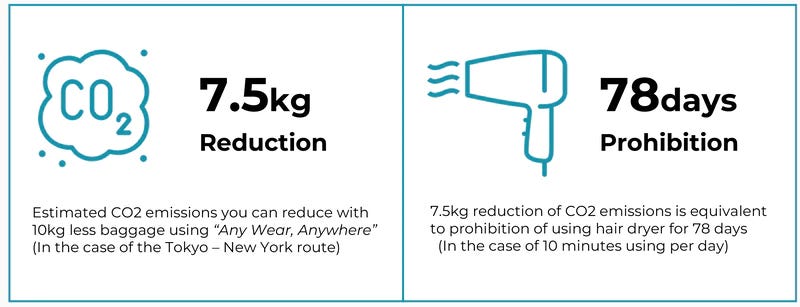Ask any 100 people, and I bet you 95 of them love travelling. I confess I’m one of the 5 who doesn’t. But it’s not like I dislike discovering other places, just that the logistics of getting there seriously mar the experience. Wouldn’t it be amazing, then, to strike at least one thing off the travel-to-do list?
That’s what Japan Airlines thought, recently introducing a year-long pilot project (pun intended), allowing you to forget about that carry-on luggage, and instead rent clothes during your stay in Japan. I know, but hear me out. Hear them out, rather.
¶
“Any Wear, Anywhere” offers different sets of clothes adapted to gender, season, and style from around £25 to £45 ($28 to $48). Without offering precise evidence, they allege that saving 10kg of weight on a flight from New York to Tokyo can save around 7.5kg of carbon emissions. This, the website is eager to declare, is the equivalent of using a hair dryer for 10 minutes a day for 78 days. I’m not sure this is the most evocative metrics, but okay, I’m here for saving the environment.
You book your favourite set of clothes, it gets delivered to your accommodation, and picked up again at the end of your stay. A snag might be that these are clothes that are supposed to go to landfill, so while it’s certainly laudable to give them one more round the block, I’m not sure I want to travel for thousands of miles and then wear future garbage on my precious holiday pictures. I’m also not sure I particularly like the clothes on offer…
Theoretically, I really do like the idea — I just don’t think those 7.5kg of CO2 will move the needle when it comes to saving the world. Let’s say there are 500 people in that Boeing 747. If they all rent clothes, they’ll save around 3.7 tons of carbon emissions per flight. Only that the footprint of one passenger is already 1.8 tons. If you rent clothes, but eat only two beef hamburgers on the ideally non-stop 14-hour flight, you’ll have accrued 6.4kg of carbon dioxide, almost as much as your carry-on luggage. And what about the costs of Japan Airlines going back and forth between accommodation and headquarters to deliver clothes? It just doesn’t really add up for me.
The scheme seems to be more about Japan Airlines bording other kinds of weight (that probably pays them more than passenger luggage) than about protecting the environment. The best way to do that would be to shut down their company anyway. Or invest in cleaner flying, rather than finding new ways of continuing business as usual. It’s like putting time, money, and research brains into developing robot bees doing the work of actual bees rather than, well, protecting actual bees. It boggles the mind somewhat.
¶
That’s all quite interesting, but what does it have to do with punctuation??? Well. “Any Wear, Anywhere” is a smart name for the scheme, because its witty workplay makes us go “ha!”. That “ha!” hinges on two things:
Firstly, “Any Wear, Anywhere” is a pun (or wordplay) working through sound. The words are spelt differently, but the pronunciation is identical. Those puns are called homophones from homos meaning “same” and phonos meaning “sound”.
“They’re” and “their” frequently causes homonymic havock when teachers dictate texts, or when we’re writing with an ear to speech rather than grammar (as we should! says the orator in me). A famous example occurs right at the beginning of Shakespeare’s historical tragedy Richard III. Evil not-yet-king-Richard strolls around on his own, mulling over the recent truce between two powerful clans of the royal family, the house of York and the house of Lancaster, both having legitimate claims to the throne of England. Richard is brother to the current king, Edward IV (a Yorkist). He says:
Now is the winter of our discontent,
Made glorious summer by this son of York:
And all the clouds that loured upon our house
In the deep bosom of the ocean buried.
Richard puns on Edward as “son” of York, now powerful like the “sun”, melting frosty winter, and the cold dark sterile discontent of not ruling. The first printed edition of the play in 1597 makes this same-sounding joke even more emphatic through the spelling ‘sonne’, which was acceptable spelling for both words. Still no punctuation…
¶
So, “Any Wear, Anywhere” is a homonym which works well when we hear it, pauses falling naturally between words, and between the first and second clause. If we encounter the name in writing, though, we need some help. And here’s where we need to mind the gap: imagine the name was printed like text was originally written over two thousand years ago, like so ANYWEARANYWHERE. That’d be pretty difficult to read, and it’d take some time figuring out the joke by which time nobody would feel like laughing anymore.
In the early days of the Western alphabet, people smushed letters together without space between words, and without any other marks of punctuation like full stops or commas. They probably understood writing as just another manifestation of speech, and since we don’t noticeably pause between words while speaking, it didn’t occur to people to somehow clarify the beginnings and endings of individual words or sentences. This is the short version of a long story you can read all about here and here, and I’m pretty sure we’ll come back to that in the future on Mind the Gap.
For now it’s enough to know that the Greeks and Romans mostly wrote capital letters without spaces and without any other signs. In the course of many centuries, the Roman empire fell, but Christianity rose, spreading far and wide across the European continent and beyond that, too. Imagine now you are an Irish monk around 750 A.D., praying away, and copying the Bible on parchment again and again. Worshop and manuscript reproduction were your tasks. But your native language is Gaelic, not Latin, the language that the Bible came to you. So, in order to understand what you’re actually scratching out by flickering candle-light, you “parse”, that is, you write the Gaelic word above the Latin one. And in order to really identify individual words, you have to separate them out somehow, so you…introduce spaces between words. At first tiny ones, then bigger and bigger. Thus was born one of the most crucial inventions in history. The gap. Space. A blank. Nothing.

Imagine everything that becomes spossible with spaces between words, and hence greater clarity, as well as faster and easier reading time: more people get to read, because deciphering isn’t so hard anymore, doesn’t require long years of grammatical training; you’re more able to grasp what a text says at first glance rather than having to pore over the page for ever; there are fewer mistakes and ambiguities, as misunderstandings based on confusing the beginning and ending of words are eliminated. And what happens then? When there’s greater clarity, ease, and speed in communication? Everything speeds up and spreads: literacy, trade, politics, knowledge, people power. One could say the single most remarkable invention of humanity (after writing itself) was nothing. No space at all.
I know, I’m saying that because I’m obsessed with punctuation. But it’s not that big of a stretch of the imagination. Just try to STRINGYOURLETTERSTOGETHERINALLYOURMESSAGESFORONESINGLEDAYANDSEEWHATHAPPENS. People receiving your messages will hate you, and you’ll spend ages deciphering your own notes. Let us know how it went!
¶
“Any Wear, Anywhere” plays on the crucial difference a gap makes. Even without the comma that helps us get the word play faster, the name would make sense. The gap beetween “any” and “wear” conditions the pacing of reading, the stress, the pauses extracting the homonym pun. That delicious pleasure when the mind goes “click”.
So, Japan Airline, while your environmental strategy leaves a lot to be desired, your punctuation game is 🔥!
Mind the Gap is free & will remain so. If you enjoy the newsletter, you can tell me that my work is valuable to you in four ways:
Let people know about Mind the Gap! It’s easy to share posts on social media and via email. 📩
Drop me a line! 💬 I love hearing from punctuation-enthusiasts (and the few haters). You can also check out my website & blog with lots of longer essays on punctuation stuff.
Buy my books! 📒📚 For example the whimsical biography of the exclamation mark, called An Admirable Point (preferably from a local bookshop!)
Donate to a charity. Karma is real. 🧿







